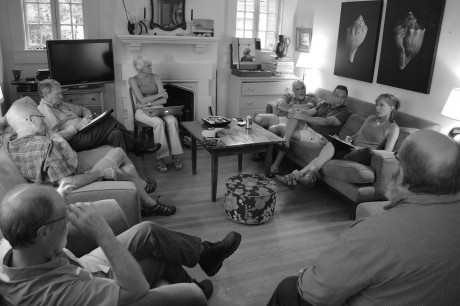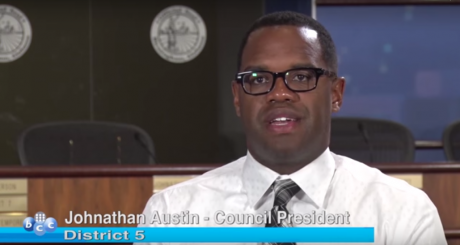
A group of commercial photographers that have been ordered by the Alabama Department of Revenue to pay six years’ worth of back sales taxes, met Monday evening to discuss a plan of action. Photo by Cody Owens.
The Alabama Department of Revenue has appealed the summary judgment granted in favor of Omni Studios on June 15 by Jefferson County Circuit Judge Houston Brown.
This will prolong the two years of litigation between the commercial photography studio and the revenue department, which has ordered Omni to pay six years’ worth of back sales taxes.
In the past because commercial photographers were deemed to provide professional services, not tangible goods, they have been exempt from sales tax in Alabama. Omni’s owner, Liesa Cole, however, was ordered to pay $28,000 in back sales tax she contends she never knew she had to pay. By her estimate, she has paid more than that in legal fees already.
“It’s one thing to say, ‘From now on you guys are going to have to pay sales taxes.’ It’s another thing entirely to try and go back retroactively and charge us for taxes we were never meant to pay. That’s always been the industry standard here,” Cole said.
In Brown’s summary judgment, he highlighted the reasons why commercial photographers have been exempt from paying Alabama sales tax.
“Omni performs a wide range of services for its clients from helping them design advertising campaigns or magazine layouts to hiring and managing assistants, models, stylists and other necessary team members to choosing locations, setting up lighting, editing copy and reviewing and processing images,” Brown wrote.
“Omni’s pricing model is to charge its customers a daily rate based on the time spent and resources deployed in providing its services rather than to charge for particular photographs or images or the number, size or type of photographs or images produced. This model differs from that of retail photographers who are typically paid based on the specific product delivered,” Brown continued.
After Brown’s ruling the Department of Revenue appealed. A representative with the agency declined to comment on the decision to appeal.
Cole, whose business is the subject of the appeal, is not alone, however. Other commercial photographers from across the state were also caught in the revenue dragnet, which the photographers decried as abusive and unnecessary. As the first case to be brought to trial, Cole’s will set a precedent for any litigation involving the other commercial photographers.
For this reason, Cole seemed to be carrying the weight of the appeal heavily on her shoulders as she sat in a living room Monday evening with 10 other photographers to discuss their plan of action.
“We need to have a united front,” Geoff Knight said as he recalled his run in with the ADOR. “They are just arbitrarily charging me, and I’m paying it; that plus the $65 a month late fees. They are taking the cumulative total of the last six years, dividing it by 72 and charging me monthly for the taxes they say I need to pay.”
Knight, however, believes he will be able to get that money back once Cole’s case is settled and there is a clear precedent for commercial photographers being exempt from sales tax. “I’m paying everything they ask me,” Knight said, “but I’m going to get it back.”

Edward Badham, a Birmingham-based commercial photographer, is set to meet with the Alabama Department of Revenue next Wednesday to discuss his initial assessment of $48,000 in back taxes. Photo by Cody Owens.
Becky Stayner said that after a recent consultation with the ADOR an auditor told her that her case was going to be dropped and not to worry about it any more.
“She told me there was going to be legislation introduced that she was not at liberty to discuss, but it was going to be in our favor and I didn’t have to fight this anymore,” Stayner said. “Then, to my surprise, I get an email from them telling me I had to pay.”
A survey of the 10 photographers suggests that revenue is handling each case differently. Some of the photographers are being charged for certain services while others are not. In order to fight back against the irregularities, commercial photographers in the state have begun to band together to make their case.
“I’m hoping we can rally as a team and say ‘all for one and one for all’ because this outcome should make everyone else’s go away,” Cole said. “The department is just hoping they can bring us to our knees and we can settle. That’s how they win. But if we band together, they can’t break us.”
A three-judge panel of the state appellate court in Montgomery will hear the case, although the date has not been set. “My lawyer said it could be anywhere from eight to nine months from now,” Cole said. “So we are just in a nail-biting pattern at this point because the [ADOR] won’t file their brief until closer to the date of the hearing, so we don’t know what points of the summary judgment they are trying to appeal.”
Birmingham-based commercial photographer Edward Badham is set to meet with the revenue department next Wednesday. “I’m going to go to Montgomery and protest my assessment,” Badham said. He was initially hit with an order to pay $46,000 in back taxes. Now, with additional late fees, he is being asked to pay $48,000, a number that will rise the more he fights back.
“I’ve been putting this meeting off because I thought Liesa’s case would be resolved and we would all be covered because of that. But they haven’t backed off. They called and scheduled my conference with them the same day they filed their appeal with Liesa’s case, which is either ironic or very calculated,” Badham explained.
“But I’m going to go down there and argue the same [expletive] that we have all been arguing all along. They are just bleeding us out,” Badham said.
The consensus among the photographers gathered Monday evening was that new legislation needs to be introduced to give them another layer of protection against the ADOR seeking back taxes. Last year a bill was introduced by Rep. Patricia Todd, D-Birmingham. Due to flaws in the language, however, the bill was killed.
The photographers are hoping that a new bill can be introduced with bi-partisan support. But until the legislature reconvenes next year, it is unclear whether or not a bill specifically exempting commercial photographers from paying sales tax will be put into law.
As the meeting came to a close, Cole seemed worn down. “Frankly, it would have been cheaper to settle,” she said. “But this isn’t just my fight, it’s all of ours. And I don’t want to quit because what that would mean for all of us.”





